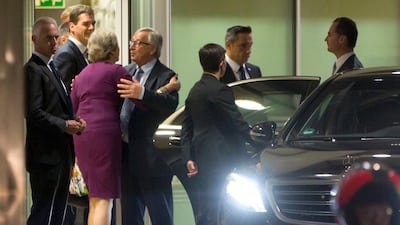Efforts to reach a Brexit deal should "accelerate over the months to come", British Prime Minister Theresa May and European Commission chief Jean-Claude Juncker said on Monday after a dinner meeting in Brussels.
Describing the meeting, which lasted around two hours, as "constructive and friendly", a joint statement said they had "reviewed the progress made in the Article 50 negotiations so far and agreed that these efforts should accelerate over the months to come".
Mrs May came to Brussels for a working dinner with Mr Juncker as fears grow that negotiations on Britain's exit from the bloc in 2019 could end without an agreement.
It came just days after Michel Barnier, the EU's chief Brexit negotiator, warned of a "disturbing deadlock" following the latest round of Brexit talks.
The two leaders were joined at the dinner table by Mr Barnier and his British counterpart, Brexit secretary David Davis.
Mr Juncker had earlier declined to answer questions about the content of the meeting ahead of time, telling reporters in Brussels: "I will meet Mrs May this evening, we will talk and you will see the autopsy."
_______________
Read more:
Hammond says EU is "the enemy" over Brexit
Britain and EU clash over who takes next Brexit step
_______________
EU leaders are meeting at a key summit in Brussels this Thursday and Friday, where they are due to decide if negotiators can move on to discussing post-Brexit trade ties, depending on whether "sufficient progress" has been made in divorce talks.
The indication from the EU side is that they will postpone their decision to a summit in December as the break-up negotiations are currently in a stalemate, particularly over the multi-billion-euro exit bill the EU says Britain must pay.
EU estimates suggest Britain must pay from 60 billion euros to 100 billion euros to settle commitments it made while part of the EU, such as development projects and the pensions of civil servants. Britain has rejected such figures.
The EU has also demanded progress on the rights of three million European citizens in Britain, and on the future of Northern Ireland.
But Britain is still hoping for a positive signal that will ease growing concern, particularly on a two-year transition period to ease the "cliff edge" for businesses and citizens of a sudden departure.
With criticism of her Brexit strategy building up at home, including within her own Conservative party, Mrs May is hoping for a breakthrough that will bolster her position and ease some of the uncertainty around Britain's withdrawal.
"We've always said we want Britain leaving the EU to be a smooth process and this is part of achieving that," Mrs May's spokesman said of the 90-minute dinner.
The Prime Minister discussed the UK’s exit negotiations ahead of the dinner in phone calls with German Chancellor Angela Merkel, French President Emmanuel Macron and Irish Prime Minister Leo Varadkar.

